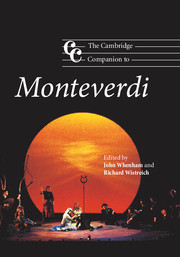Book contents
- Frontmatter
- Dedication
- Contents
- List of illustrations
- Notes on contributors
- Preface
- Chronology
- 1 Approaching Monteverdi: his cultures and ours
- 2 Musical sources
- 3 A model musical education: Monteverdi's early works
- INTERMEDIO I ‘Ecco mormorar l'onde’ (1590)
- 4 Monteverdi at Mantua, 1590–1612
- 5 Spaces for music in late Renaissance Mantua
- 6 The Mantuan madrigals and Scherzi musicali
- INTERMEDIO II ‘Ahi, come a un vago sol cortese giro’ (1605)
- 7 Orfeo (1607)
- 8 The Mantuan sacred music
- INTERMEDIO III ‘Laetatus sum’ (1610)
- 9 Music in Monteverdi's Venice
- 10 The Venetian secular music
- INTERMEDIO IV Lamento della ninfa (1638)
- 11 The Venetian sacred music
- INTERMEDIO V Magnificat SV281 (1641)
- 12 Monteverdi's late operas
- INTERMEDIO VI Il ritorno d'Ulisse (1640), Act V, scene 10
- 13 Monteverdi studies and ‘new’ musicologies
- 14 Monteverdi in performance
- Notes
- Bibliography
- Selected discography
- The works of Monteverdi: catalogue and index
- Index of titles and first lines
- Index of names and subjects
9 - Music in Monteverdi's Venice
Published online by Cambridge University Press: 28 September 2011
- Frontmatter
- Dedication
- Contents
- List of illustrations
- Notes on contributors
- Preface
- Chronology
- 1 Approaching Monteverdi: his cultures and ours
- 2 Musical sources
- 3 A model musical education: Monteverdi's early works
- INTERMEDIO I ‘Ecco mormorar l'onde’ (1590)
- 4 Monteverdi at Mantua, 1590–1612
- 5 Spaces for music in late Renaissance Mantua
- 6 The Mantuan madrigals and Scherzi musicali
- INTERMEDIO II ‘Ahi, come a un vago sol cortese giro’ (1605)
- 7 Orfeo (1607)
- 8 The Mantuan sacred music
- INTERMEDIO III ‘Laetatus sum’ (1610)
- 9 Music in Monteverdi's Venice
- 10 The Venetian secular music
- INTERMEDIO IV Lamento della ninfa (1638)
- 11 The Venetian sacred music
- INTERMEDIO V Magnificat SV281 (1641)
- 12 Monteverdi's late operas
- INTERMEDIO VI Il ritorno d'Ulisse (1640), Act V, scene 10
- 13 Monteverdi studies and ‘new’ musicologies
- 14 Monteverdi in performance
- Notes
- Bibliography
- Selected discography
- The works of Monteverdi: catalogue and index
- Index of titles and first lines
- Index of names and subjects
Summary
In November 1619 Francesco Dognazzi, maestro di cappella to the Duke of Mantua whose forebears had been Monteverdi's employers, arrived in Venice (see Monteverdi's letter of 8 March 1620). When Santi Orlandi, who had been in charge of music at the Gonzaga court, had died in the previous July, Monteverdi had been invited to return to the Duke's service. In Venice, where rumours of Monteverdi's departure from his post at S. Marco were already rife, Dognazzi's mission was to advance the cause of a return to Mantua. In this he failed. Writing to Alessandro Striggio, a Mantuan court secretary who had been Monteverdi's librettist for Orfeo, Monteverdi enumerated some of his reasons for staying in Venice:
Nor is there any gentleman who does not esteem and honour me, and when I am about to perform either chamber or church music, I swear to Your Lordship that the entire city comes running.
Next, the duties are very light since the whole choir is liable to discipline except the director of music – in fact, it is in his hands, having a singer censured or excused and giving leave or not; and if he does not go into chapel nobody says anything. Moreover, his allowance is assured until his death: neither the death of a procurator nor that of a doge interferes with it, and by always serving faithfully and with reverence he has greater expectations, not the opposite; and as regards his salary, if he does not go at the appointed time to pick it up, it is brought round to his house. And this is the first particular, as regards basic income; then there is occasional income, which consists of whatever extra I can easily earn outside S. Marco, of about two hundred ducats a year (invited as I am again and again by the wardens of the guilds [signori guardiani di scole]. Because whoever can engage the director to look after their music – not to mention the payment of thirty ducats, and even forty, and up to fifty for two Vespers and a Mass – does not fail to take him on, and they also thank him afterwards with well-chosen words.
Now let Your Lordship weigh in the balance of your very refined judgement that amount which you have offered me in His Highness’s name, and see whether – on good and solid grounds – I could make the change or not.
(Letter of 13 March 1620)- Type
- Chapter
- Information
- The Cambridge Companion to Monteverdi , pp. 163 - 178Publisher: Cambridge University PressPrint publication year: 2007

